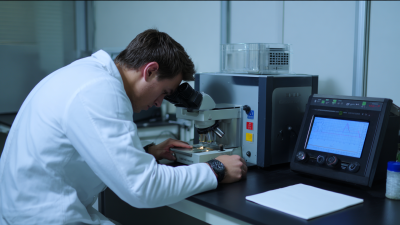Advantages of Using Marsh Gauges for Accurate Measurement in Various Industries
In a world where precision is paramount across various sectors, marsh gauges have emerged as essential instruments for accurate measurement. According to a recent report by the International Measurement Institute, the demand for precise measurement tools in industries such as oil and gas, water management, and manufacturing is projected to grow by over 15% annually until 2025.

Marsh gauges, known for their reliability and ease of use, are increasingly adopted in these fields to ensure compliance and enhance operational efficiency. Their capability to measure liquid levels accurately not only helps in effective resource management but also minimizes environmental risks associated with overflows or leaks. As industries strive for transparency and sustainability, incorporating marsh gauges into measurement practices stands out as a cutting-edge solution that offers both economic and ecological benefits.
Benefits of Marsh Gauges in Precision Measurement Across Industries
Marsh gauges have gained significant traction across various industries due to their exceptional accuracy in measurement. These instruments are particularly beneficial in industries such as oil and gas, water management, and construction, where precise data is vital for operational efficiency. According to a recent report by the International Society of Automation, accurate measurements can increase production efficiency by over 20%, underscoring the importance of using reliable measurement tools like Marsh gauges.

One of the primary benefits of Marsh gauges is their ability to measure levels of industrial fluids with minimal error. The gauges employ specialized technology to minimize human error and environmental variables, resulting in more reliable readings. In fact, the American Society for Testing and Materials (ASTM) states that using high-precision instrumentation can reduce measurement uncertainties by up to 15%, leading to better decision-making processes in operational management.
Tips: When implementing Marsh gauges, it's crucial to regularly calibrate them to maintain their accuracy. Additionally, training staff on optimal usage can drastically improve measurement outcomes. Consider conducting periodic audits to track performance and accuracy, ensuring sustained operational excellence and optimal resource management.
How Marsh Gauges Enhance Data Accuracy in Manufacturing Processes
Marsh gauges have emerged as a critical tool in various manufacturing processes, significantly enhancing data accuracy. These gauges provide precise measurements of liquid level, pressure, and density, which are vital for maintaining optimal operational efficiency. In industries where the consistency of materials is paramount, such as food and beverage, pharmaceuticals, and chemicals, the use of marsh gauges ensures that data collected is reliable and meets quality control standards.
To maximize the effectiveness of marsh gauges, it's essential to calibrate and maintain them regularly. This involves routine checks to confirm that the gauges are providing accurate readings and adjusting as necessary to account for environmental changes. Furthermore, training staff on the proper use and interpretation of marsh gauge data can greatly improve overall measurement accuracy, leading to better decision-making in the manufacturing process.
Another tip is to integrate marsh gauges with data management systems. By uploading the measurements taken from these gauges into a centralized system, manufacturers can analyze trends over time, identify potential issues before they escalate, and optimize production schedules. This synergy not only enhances data accuracy but also fosters a proactive approach toward quality assurance and efficiency in manufacturing processes.
Advantages of Using Marsh Gauges for Accurate Measurement in Various Industries
| Industry | Measurement Parameters | Accuracy (%) | Application Benefits |
|---|---|---|---|
| Manufacturing | Fluid Level, Pressure | ±0.5% | Enhanced production quality, Reduced wastage |
| Chemical Processing | Chemical Concentration, Temperature | ±0.2% | Improved safety, Optimized reactions |
| Water Treatment | Flow Rate, Turbidity | ±0.3% | Reliable monitoring, Compliance with regulations |
| Oil and Gas | Pressure, Level | ±0.1% | Increased efficiency, Reduced operational costs |
| Pharmaceuticals | Dosage, Temperature | ±0.1% | Enhanced product safety, Compliance with quality standards |
Applications of Marsh Gauges in Environmental Monitoring and Management
Marsh gauges have become an essential tool in environmental monitoring and management, offering precision in measuring water levels in various contexts. These gauges are particularly beneficial in wetlands and riverine ecosystems, allowing scientists and environmentalists to track changes in water levels that directly impact flora and fauna. The ability to collect consistent data over time enhances our understanding of ecological dynamics, informing conservation efforts and habitat restoration projects.
In addition to natural ecosystems, marsh gauges are instrumental in urban planning and water resource management. By accurately measuring groundwater levels, these instruments help municipalities manage flood risks and develop sustainable drainage systems. Their application in monitoring the health of municipal water bodies ensures compliance with environmental regulations, contributing to better water quality management. The versatility of marsh gauges makes them a valuable asset in addressing the complex environmental challenges faced today.
Comparative Analysis: Marsh Gauges vs. Traditional Measurement Tools
When it comes to accurate measurement across various industries, marsh gauges offer distinct advantages over traditional measurement tools. Traditional tools, such as mechanical gauges and basic rulers, often come with limitations in precision and reliability, particularly in challenging environments. In contrast, marsh gauges are designed specifically for demanding conditions, providing superior accuracy through advanced calibration techniques and robust construction. This ensures that measurements are consistent and trustworthy, which is crucial for applications in fields like construction, oil and gas, and environmental monitoring.
Additionally, the ease of use and versatility of marsh gauges further solidify their position as a superior alternative. While traditional tools may require extensive training and adjustment for precise measurements, marsh gauges are intuitively designed, allowing for quick adaptation by operators. This not only reduces the risk of human error but also enhances productivity, as workers can focus on the task at hand rather than struggling with complex measuring instruments. Overall, the comparative analysis shows that marsh gauges not only meet the accuracy demands of various industries but also streamline operations, providing significant advantages over traditional measurement methods.
Cost-Effectiveness of Utilizing Marsh Gauges in Industrial Settings
In today's competitive industrial landscape, cost-effectiveness is an essential consideration for businesses striving to enhance productivity while minimizing expenses.
 Marsh gauges, known for their high accuracy and reliability, offer a promising solution for various industries looking to improve measurement practices without breaking the bank. Their straightforward design reduces maintenance costs, allowing companies to allocate resources more efficiently. Additionally, the robustness of marsh gauges ensures longevity, diminishing the frequency of replacements and repairs, which contributes significantly to overall savings.
Marsh gauges, known for their high accuracy and reliability, offer a promising solution for various industries looking to improve measurement practices without breaking the bank. Their straightforward design reduces maintenance costs, allowing companies to allocate resources more efficiently. Additionally, the robustness of marsh gauges ensures longevity, diminishing the frequency of replacements and repairs, which contributes significantly to overall savings.
Furthermore, using marsh gauges can streamline operations by providing precise measurements that enhance process control. Accurate data leads to better decision-making, reducing waste and inefficiencies that often arise from measurement errors. As manufacturers and service providers increasingly seek ways to optimize their operations, integrating marsh gauges into their measurement systems emerges as a wise and cost-effective choice. This implementation can result in significant financial benefits over time, coupling accuracy with affordability to foster sustainable industrial practices.
Related Posts
-

10 Essential Tips for Choosing the Best Digital Pressure Gauges in Your Industry
-

7 Reasons Why Investing in Test Instruments Can Transform Your Quality Assurance Process
-

Essential Checklist for Choosing the Right Digital Pressure Gauges
-

5 Essential Tips for Choosing the Right Liquid Filled Gauges
-

7 Essential Low Pressure Gauges You Need for Accurate Measurements
-

7 Surprising Benefits of Liquid Filled Pressure Gauges for Your Industry
Contact
3295 Cobb International Blvd.
Kennesaw, GA 30152
800-367-1377
sale@patiostools.com
Info
© 2023 - Marsh Instruments


